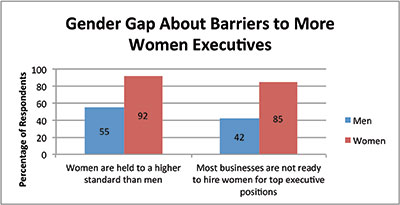
 How do North Carolinians see women as business leaders? In the next decade, how likely is it that there will be an equal number of females and males in top executive positions? What is the impact of family?
How do North Carolinians see women as business leaders? In the next decade, how likely is it that there will be an equal number of females and males in top executive positions? What is the impact of family?
To learn the answers to these questions, Raleigh's Meredith College surveyed registered voters in the state. According to the poll, 85 percent of North Carolinians perceive the leadership abilities of men and women equally.
"The good news for women is that the public is seeing them as equally qualified to men in terms of leading corporations," says Kristie Ogilvie, dean of the Meredith College School of Business.
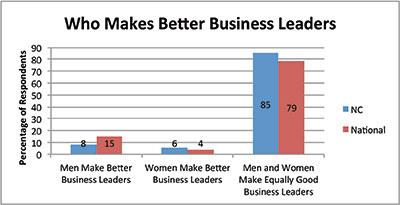 Although there are still relatively few women CEOs, the picture for female business owners is brighter, with recent research showing the number of woman-owned firms in the nation increasing 57 percent in the last decade. The Tar Heel State is one of the top 10 states in the country, with the number of women-owned businesses here jumping 83 percent in the last 15 years. North Carolinians' views on the abilities of females to be successful entrepreneurs reflect this growth.
Although there are still relatively few women CEOs, the picture for female business owners is brighter, with recent research showing the number of woman-owned firms in the nation increasing 57 percent in the last decade. The Tar Heel State is one of the top 10 states in the country, with the number of women-owned businesses here jumping 83 percent in the last 15 years. North Carolinians' views on the abilities of females to be successful entrepreneurs reflect this growth.
However, the reality is that a majority of large corporations in this country are led by men. Looking at the situation, our fellow citizens are generally pessimistic about women achieving gender equity in the role of corporate titan.
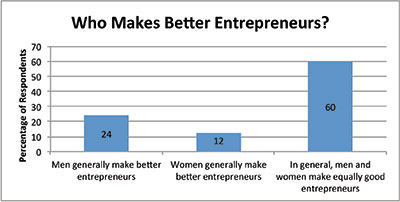 When asked if there will be an equal number of women and men in lofty positions in the next decade, a slight majority of all North Carolinians (57 percent) thought it was likely or very likely to happen. Less than half of the women surveyed (47 percent) thought that gender equity would be achieved in corporate CEO positions in the next decade.
When asked if there will be an equal number of women and men in lofty positions in the next decade, a slight majority of all North Carolinians (57 percent) thought it was likely or very likely to happen. Less than half of the women surveyed (47 percent) thought that gender equity would be achieved in corporate CEO positions in the next decade.
"If a woman is as qualified and is perceived as qualified but a majority of corporations are not ready to put women in those roles, then I don't believe we are as far along as we need to be," Ogilvie suggests.
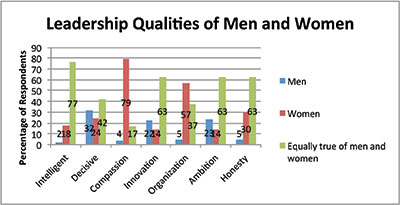 North Carolinians' opinions about the difficulty women have in reaching the pinnacle has little to do with their perceptions of the abilities of women. On most qualities associated with being the big cheese, women were seen as equal to men while on two qualities – compassion and organization – were considered to be superior.
North Carolinians' opinions about the difficulty women have in reaching the pinnacle has little to do with their perceptions of the abilities of women. On most qualities associated with being the big cheese, women were seen as equal to men while on two qualities – compassion and organization – were considered to be superior.
Men, according to North Carolinians, have an advantage in terms of taking risks. But in every other behavior associated with the head honcho, a majority of people feel that women are at least equal to men. On behaviors affecting workers, such as providing good compensation packages and mentoring newer employees, women are perceived as extremely strong.
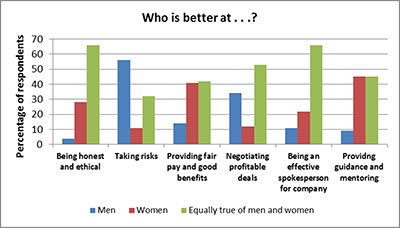 So, respondents were asked for reasons there are relatively few women who own their own companies or serve in authoritative jobs. Their answer: North Carolinians, like most Americans, feel there is a double standard for women in business.
So, respondents were asked for reasons there are relatively few women who own their own companies or serve in authoritative jobs. Their answer: North Carolinians, like most Americans, feel there is a double standard for women in business.
Over three-quarters of people in our state believe that men have it easier in the world of commerce, especially in achieving the corner office.
People feel that women have to do more than their male counterparts to prove themselves (84 percent) and that corporate America is not ready to see women as the top brass (79 percent).
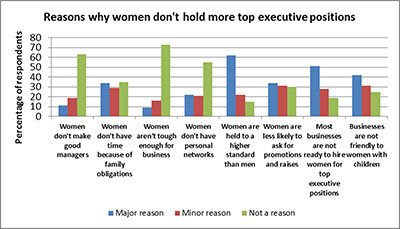 On the larger question of equal rights, a large majority of North Carolinians (83 percent) feel that the country needs to continue to make changes to give women equal rights with men, a stand that feeds directly into these beliefs about women having unique barriers to gender equality in the workplace.
On the larger question of equal rights, a large majority of North Carolinians (83 percent) feel that the country needs to continue to make changes to give women equal rights with men, a stand that feeds directly into these beliefs about women having unique barriers to gender equality in the workplace.
